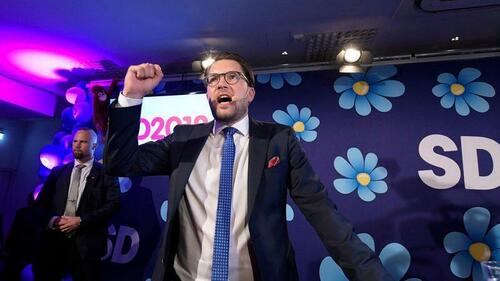
The far-right, anti-immigrant Sweden Democrats (SD) party overtook the main right-wing opposition party in the polls on Monday ahead of the parliamentary elections on 11 September, becoming Sweden's second largest party general elections in September, Euroactiv reported.
According to the latest opinion poll from SVT/Novus, the Sweden Democrats are now the main challengers of Prime Minister Magdalena Andersson’s incumbent Social Democrats currently leading a minority government.
Sweden Democrats stood at 21.5%, compared to the Moderate’s 17.4%, pitting the eurosceptic party only behind the ruling Social Democrats, who stood at 27.8%.

Pressed about his prime ministerial prospects, SD leader Jimmie Åkesson said he does not want to make any announcements before the election.
In an interview on Swedish Radio, Åkesson declined to comment whether he would demand the role of prime minister if his party tops the polls or whether SD would require a place in a future right-wing government.
“I don’t think I should have to sit and draw any red lines about what the government should look like at the moment. We’ll have to decide that after the elections. If I had my way, I’d be in a majority government, but I don’t get to do that on my own,” he told Swedish radio P3.
Sweden’s parliament currently sports four left-leaning and four right-leaning parties, increasing the reliance of the future executive on deal-making.
Opposition and Moderate party leader Ulf Kristersson earlier ruled out a far-right party being allowed to sit in a potential right-wing government but was open to some cooperation with the SD.
“I want to give them a serious influence that we agree on before the government is elected. That we have a common vision of what we want to achieve and that we have concrete goals,” Kristersson told Swedish newspaper DN.
The polls also indicated that the Swedish elections would be incredibly tight as the difference between the right and left-wing blocs is only 0.3 percentage points.
The ruling Social Democrats, the Green Party, the Left Party and the Centre Party are predicted to gain 49.6% of the votes. In contrast, the right-wing Moderates, the Christian Democrats, the Liberals and the far-right Sweden Democrats are polling at 49.3%.
Translated to mandates in the parliament, elections with this outcome would result in the two blocs separated by only one seat out of 349 in the Swedish legislative.
Novus CEO Torbjörn Sjöström said “this sets out the playing field between now and the election,” adding however that the new daily polls led by Novus and SVT are based on three days of polling only. “This survey shows that it is statistically certain that the Sweden Democrats would be bigger than the Moderates if there were an election today, but exactly how large that difference is is affected by the margin of error,” he added.
The far-right, anti-immigrant Sweden Democrats (SD) party overtook the main right-wing opposition party in the polls on Monday ahead of the parliamentary elections on 11 September, becoming Sweden’s second largest party general elections in September, Euroactiv reported.
According to the latest opinion poll from SVT/Novus, the Sweden Democrats are now the main challengers of Prime Minister Magdalena Andersson’s incumbent Social Democrats currently leading a minority government.
Sweden Democrats stood at 21.5%, compared to the Moderate’s 17.4%, pitting the eurosceptic party only behind the ruling Social Democrats, who stood at 27.8%.

Pressed about his prime ministerial prospects, SD leader Jimmie Åkesson said he does not want to make any announcements before the election.
In an interview on Swedish Radio, Åkesson declined to comment whether he would demand the role of prime minister if his party tops the polls or whether SD would require a place in a future right-wing government.
“I don’t think I should have to sit and draw any red lines about what the government should look like at the moment. We’ll have to decide that after the elections. If I had my way, I’d be in a majority government, but I don’t get to do that on my own,” he told Swedish radio P3.
Sweden’s parliament currently sports four left-leaning and four right-leaning parties, increasing the reliance of the future executive on deal-making.
Opposition and Moderate party leader Ulf Kristersson earlier ruled out a far-right party being allowed to sit in a potential right-wing government but was open to some cooperation with the SD.
“I want to give them a serious influence that we agree on before the government is elected. That we have a common vision of what we want to achieve and that we have concrete goals,” Kristersson told Swedish newspaper DN.
The polls also indicated that the Swedish elections would be incredibly tight as the difference between the right and left-wing blocs is only 0.3 percentage points.
The ruling Social Democrats, the Green Party, the Left Party and the Centre Party are predicted to gain 49.6% of the votes. In contrast, the right-wing Moderates, the Christian Democrats, the Liberals and the far-right Sweden Democrats are polling at 49.3%.
Translated to mandates in the parliament, elections with this outcome would result in the two blocs separated by only one seat out of 349 in the Swedish legislative.
Novus CEO Torbjörn Sjöström said “this sets out the playing field between now and the election,” adding however that the new daily polls led by Novus and SVT are based on three days of polling only. “This survey shows that it is statistically certain that the Sweden Democrats would be bigger than the Moderates if there were an election today, but exactly how large that difference is is affected by the margin of error,” he added.







